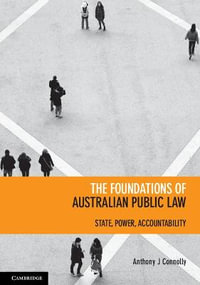
Fundamentals of Criminal Practice
Law and Procedure
By: Daniel C. K. Chow, Thomas E. Mcclure, Thomas E. Eimermann
Paperback | 2 February 2020 | Edition Number 2
At a Glance
Paperback
$459.90
Aims to ship in 15 to 25 business days
When will this arrive by?
Enter delivery postcode to estimate
Fundamentals of Criminal Law and Procedure for Paralegals focuses on providing the skills and knowledge students need to function effectively in careers related to criminal law. From investigation and discovery, to trial and sentencing, this text traces every step of the way through five hypothetical criminal cases that illustrate procedure, raise discussion questions, and engage students in skill-building exercises. Realistic and practical, the text engages students with discussions of the criminal justice system, the role of police and lawyers, the basic principles of criminal law, constitutional limitations, and trial procedures.
New to the Second Edition:
- The book now covers Legal Defenses before Discovery and Disclosure, more accurately reflecting real world practice.
- Expanded coverage on the handling of cases involving driving under the influence, police officers' use of excessive force, sexual offenses, and diversion programs offered by specialized courts.
- New Chapter 15 on Related Proceedings, covering Collateral Remedies, Clemency, Removing and Limiting Access to Criminal Records, Recovery of Seized Assets and Challenging Summary Suspensions of Driver's Licenses.
- Revisions to make the text even more accessible to students, with learning objectives in every chapter and carefully edited discussions of key concepts.
- The title of the book has been changed to more accurately reflect the content of the book.
Professors and students will benefit from:
- A logical three-part organization:
- Criminal Law: The criminal justice system, principles of criminal law, and types of criminal offenses
- Criminal Procedure: From commission of the offense to plea bargaining
- Criminal Procedure: Trials and their aftermath
- An emphasis on the role of paralegals, lawyers, and law enforcement in criminal cases
- Five hypothetical cases woven throughout the text that illustrate procedure, raise discussion questions, and offer opportunities for research exercises
- Coverage of both white collar and "street crime," from both state and federal perspectives
- Excerpts from statutes, court opinions, investigative reports, and pleadings
- Strong pedagogy, including discussion questions, application exercises, marginal definitions, and end-of-chapter review questions.
- Assignments that mirror the tasks a paralegal would perform in a prosecutor or defense counsel's office
ISBN: 9781543810790
ISBN-10: 1543810799
Series: Aspen Paralegal
Published: 2nd February 2020
Format: Paperback
Language: English
Number of Pages: 576
Publisher: ASPEN PUBL
Edition Number: 2
Dimensions (cm): 25.4 x 20.32 x 2.97
Weight (kg): 1.13
Shipping
| Standard Shipping | Express Shipping | |
|---|---|---|
| Metro postcodes: | $9.99 | $14.95 |
| Regional postcodes: | $9.99 | $14.95 |
| Rural postcodes: | $9.99 | $14.95 |
How to return your order
At Booktopia, we offer hassle-free returns in accordance with our returns policy. If you wish to return an item, please get in touch with Booktopia Customer Care.
Additional postage charges may be applicable.
Defective items
If there is a problem with any of the items received for your order then the Booktopia Customer Care team is ready to assist you.
For more info please visit our Help Centre.























